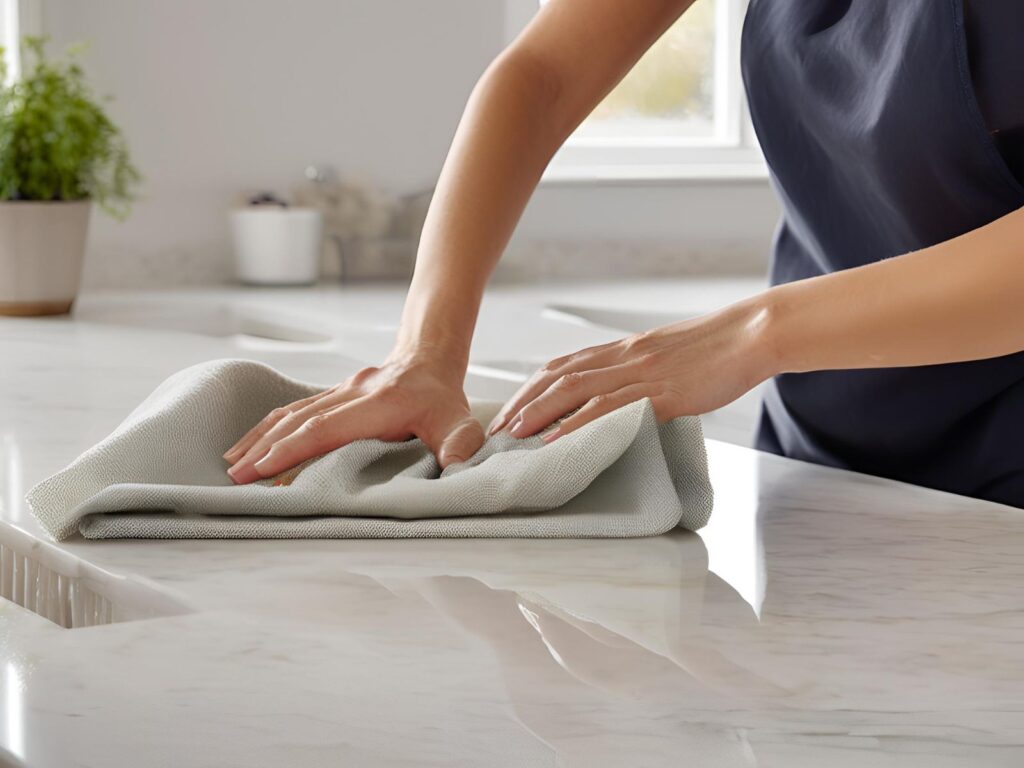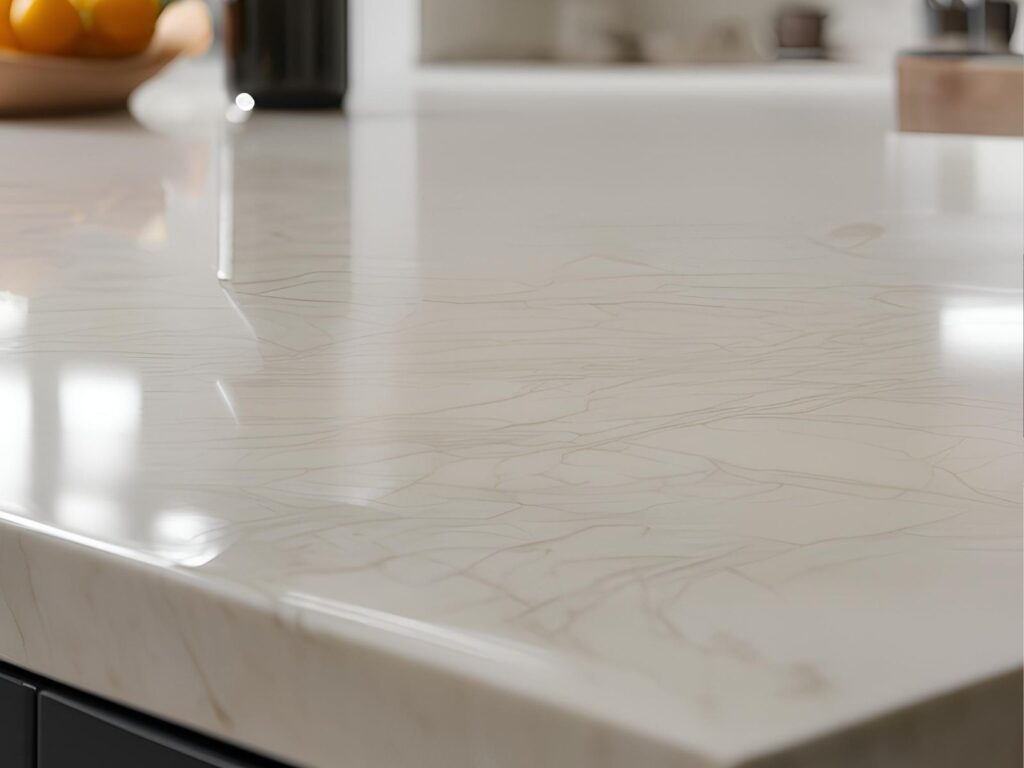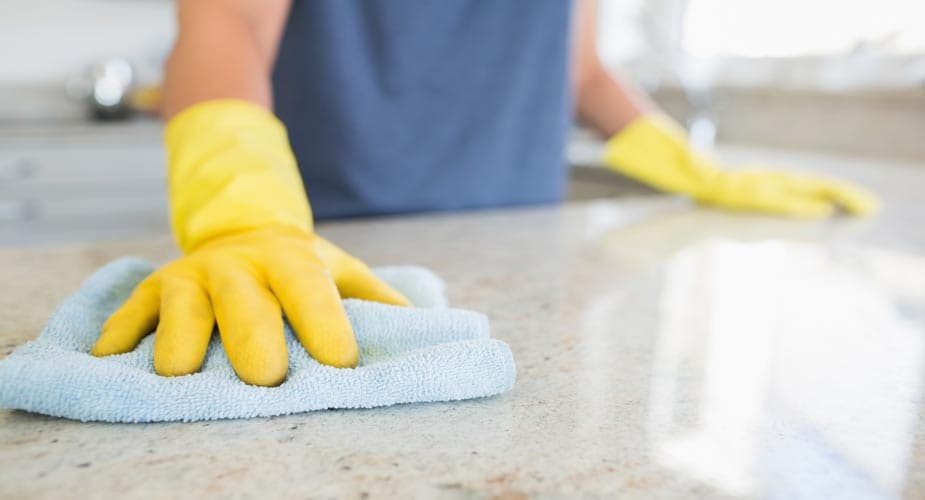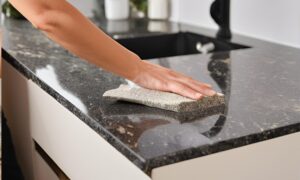Table of Contents
- Understanding Quartz Worktops
- Benefits of Quartz Worktops
- Durability
- Low Maintenance
- Aesthetic Appeal
- Hygienic
- Versatility
- Our top tips to keep your quartz surfaces clean:
- Wipe up spills immediately
- Avoid harsh chemicals
- Use a soft cloth or sponge
- Our Recommended Daily quartz Worktop Cleaning Routine
- Wipe down surfaces
- Rinse and dry
- Spot clean as needed
- How to make quartz countertops shine
- Clean the surface thoroughly
- Buff with a dry microfibre cloth
- What Should You Use on Quartz Worktops?
- What cloth should you use for cleaning quartz?
- What cloths should you NOT use for cleaning quartz?
- Top mistakes when caring for your Quartz Worktop
- Using harsh chemicals
- Scrubbing with abrasive materials
- Placing hot items directly on the surface
- Leaving spills unattended
- How to Remove Limescale from Quartz Worktops
- How to get stains out of quartz countertops
- Heat-Induced Stains
- Handling Heat Damage on Quartz Worktops
- Use Trivets or Hot Pads
- Immediate Cleaning
- Gentle Cleaners
- Troubleshooting Common Issues
- Common Problems with Quartz Worktops
- Stains
- Discolouration
- Cracks
- Frequently Asked Questions (FAQs)
- Can You Use Bleach on Quartz Worktops?
- Do you need to seal Quartz Worktops?
- Do quartz worktops stain?
- Quartz Worktops with Surrey Marble and Granite
How To Clean Quartz Worktops
Quartz worktops are a stunning and durable addition to any kitchen, combining beauty with practicality. However, like any surface, they require proper care to maintain their shine and elegance. Compared to other stone worktops like granite and marble, quartz is non-porous and easy to clean, making it a fantastic low-maintenance choice. Let’s explore the best ways on how to clean quartz worktops below.

Understanding Quartz Worktops
Quartz worktops are a popular choice for kitchen and bathroom countertops due to their durability, low maintenance, and aesthetic appeal. These surfaces are crafted from a combination of natural quartz and resin, resulting in a hard-wearing and resilient material. One of the standout features of quartz worktops is their availability in a wide range of colours and finishes, making them a versatile option that can complement various design schemes. Whether you prefer a sleek, modern look or a more traditional style, there’s a quartz worktop to suit your taste.
Benefits of Quartz Worktops
Quartz worktops offer several benefits that make them an excellent choice for any home:
Durability
Quartz worktops are incredibly resistant to scratches, cracks, and chips, making them ideal for busy kitchens and bathrooms where wear and tear are common.
Low Maintenance
Keeping quartz worktops clean is a breeze. All you need is a soft cloth and warm water to maintain their pristine appearance.
Aesthetic Appeal
With a vast array of colours and finishes available, quartz worktops can easily match any design scheme, adding a touch of elegance to your space.
Hygienic
The non-porous nature of quartz worktops means they resist bacteria and other microorganisms, making them a hygienic choice for food preparation areas.
Versatility
Beyond kitchen countertops, quartz worktops can be used in various applications, including bathroom vanities and flooring, offering a cohesive look throughout your home.

Our top tips to keep your quartz surfaces clean:
To maintain the natural beauty of quartz, follow these simple tips:
For tough stains, use appropriate cleaning products and techniques, ensuring patience and gentle methods to avoid damaging the quartz surface.
Wipe up spills immediately
Quartz is resistant to stains, but substances like wine, coffee, or sauces can cause tough stains if left too long.
Avoid harsh chemicals
Stick to gentle, pH-neutral cleaners to prevent damaging the surface.
Use a soft cloth or sponge
For everyday cleaning, a microfibre cloth or a soft sponge will safely lift dirt without scratching.
Our Recommended Daily quartz Worktop Cleaning Routine
To keep your quartz worktops looking their best, follow this easy daily routine:
Wipe down surfaces
Use a damp microfibre cloth with warm water and a mild detergent to clean up spills or crumbs.
Rinse and dry
After wiping, use a dry, soft cloth to remove excess moisture and leave a streak-free shine.
Spot clean as needed
For sticky or dried-on spills, including tough stains, use the green side of a sponge scourer and a little soapy water to effectively clean the area, then rinse and dry thoroughly.

How to make quartz countertops shine
Achieving a brilliant shine on your quartz countertops is simple with the right approach. Here’s how to keep your surfaces sparkling:
Clean the surface thoroughly
Start by wiping down the countertop with a microfibre cloth and warm, soapy water. This removes any dirt, crumbs, or grease, ensuring a clean foundation for polishing.
Buff with a dry microfibre cloth
Use a clean, dry microfibre cloth to buff the surface in circular motions, gently polishing it to a streak-free finish. This will bring out the glossy look that quartz is known for.
What Should You Use on Quartz Worktops?
When it comes to cleaning quartz worktops, less is more. You don’t need harsh chemicals or complicated solutions to keep them clean. In fact, using the wrong products can do more harm than good. Stick to simple, pH-neutral cleaning solutions like mild dish soap mixed with warm water. This combination is gentle yet effective enough to remove everyday grime and spills.
For deeper cleaning, consider using a quartz-specific cleaner that is designed to enhance the surface’s shine without causing damage. These cleaners are formulated to maintain the finish while providing an extra layer of protection. Always use a soft cloth or non-abrasive sponge to avoid scratching the surface.
What cloth should you use for cleaning quartz?
For the best results when cleaning quartz worktops, always choose a soft microfiber cloth. Microfiber is highly absorbent, which makes it perfect for lifting away dirt, grease, and spills without scratching the surface. It also helps to create a streak-free finish, ensuring that your quartz worktop looks as good as new.
Alternatively, a soft cotton cloth can also be used for gentle cleaning. The key is to ensure the material is non-abrasive to prevent damage to the quartz’s smooth finish.
What cloths should you NOT use for cleaning quartz?
When cleaning quartz worktops, avoid using abrasive materials that can scratch the surface or dull its shine. Steel wool and scouring pads should be avoided at all costs, as they can leave visible marks or scratches that are difficult to repair.
Similarly, avoid cloths or sponges that have been used with harsh chemicals. Even if you rinse them out, residues from previous cleanings could still be present, which may damage the quartz surface.
Top mistakes when caring for your Quartz Worktop
Below, we’ve outlined some of the most common mistakes people make when caring for their quartz worktops:
Using harsh chemicals
Cleaners like bleach, ammonia, or high-acid products can damage the surface and dull its finish.
Scrubbing with abrasive materials
Scouring pads and steel wool can leave scratches on your quartz worktop.
Placing hot items directly on the surface
Although quartz is heat resistant, direct heat from pots and pans can cause cracks or damage over time. Always use trivets or heat pads.
Leaving spills unattended
While quartz is stain-resistant, leaving spills (especially acidic ones) for long periods can lead to marks or dull spots.

How to Remove Limescale from Quartz Worktops
Limescale can be a common issue, especially in hard water areas. Fortunately, it’s easy to remove from quartz surfaces with the right approach. A gentle limescale remover that’s suitable for use on quartz should be applied carefully to the affected area. Let it sit for a few minutes before wiping away with a damp cloth.
How to get stains out of quartz countertops
Quartz is resistant to most stains, but certain substances like wine, coffee, or oil can leave marks if left for too long. To remove these, start with a mild dish soap and warm water. For tough stains, make a paste with baking soda and water. Apply the paste to the stain and let it sit for a few minutes before wiping it away with a damp cloth.
Avoid using harsh stain removers or bleaching agents, as they can damage the surface. Regular cleaning will help prevent stains from forming in the first place.
Heat-Induced
Stains
Heat-induced stains can occur on quartz worktops when hot pans or appliances are placed directly on the surface. This can cause thermal shock, leading to discolouration or even damage to the quartz surface. While quartz is heat resistant, it’s not entirely impervious to the effects of extreme temperatures.
Handling Heat Damage on Quartz Worktops
To handle heat damage on quartz worktops, follow these steps:
Use Trivets or Hot Pads
Always place hot pans or appliances on a trivet or hot pad to protect the quartz surface from direct heat.
Immediate Cleaning
If a heat-induced stain occurs, clean the area immediately with a soft cloth and warm water to prevent further damage.
Gentle Cleaners
For stubborn stains, use a gentle cleaner specifically designed for quartz surfaces. Avoid abrasive cleaners or scrubbers, as they can damage the quartz surface.
Troubleshooting Common Issues
Quartz worktops are generally durable and low maintenance, but common issues can still arise. Here are some common problems with quartz worktops and how to troubleshoot them:
Common Problems with Quartz Worktops
Stains
While quartz worktops are resistant to most stains, certain substances can leave marks if not cleaned properly. To remove stains, use a gentle cleaner specifically designed for quartz surfaces and a soft cloth.
Discolouration
Exposure to harsh chemicals or extreme temperatures can cause discolouration. To prevent this, avoid using harsh chemicals and protect the surface from extreme heat.
Cracks
Excessive force or stress can cause cracks in quartz worktops. To prevent cracks, avoid sitting, standing or placing very heavy objects on the surface.
By following these tips and maintaining regular care, you can keep your quartz worktops looking beautiful and functional for years to come.
Frequently Asked Questions (FAQs)
Can You Use Bleach on Quartz Worktops?
No, bleach should never be used on quartz worktops. The harsh chemicals in bleach can damage the surface and cause discolouration. Stick to mild, non-abrasive cleaners to keep your quartz looking its best.
Do you need to seal Quartz Worktops?
No, quartz worktops do not require sealing. Unlike natural stone, quartz is non-porous, which means it doesn’t absorb liquids and resists stains without the need for a sealant.
Do quartz worktops stain?
Quartz is highly stain-resistant due to its non-porous nature. However, if spills are left unattended for an extended period, substances like red wine, coffee, or oil can leave marks. Even stubborn marks such as these can be removed using the proper techniques as detailed previously in this article.
Quartz Worktops with Surrey Marble and Granite
By following these simple cleaning tips, you can ensure your quartz worktops stay as beautiful and durable as the day they were installed. Regular maintenance not only preserves their stunning appearance but also protects your investment for years to come.
If you’re looking for more expert advice on maintaining your quartz surfaces or need help selecting the perfect worktop, feel free to get in touch with us. Our team is here to provide guidance and answer any questions you may have.






